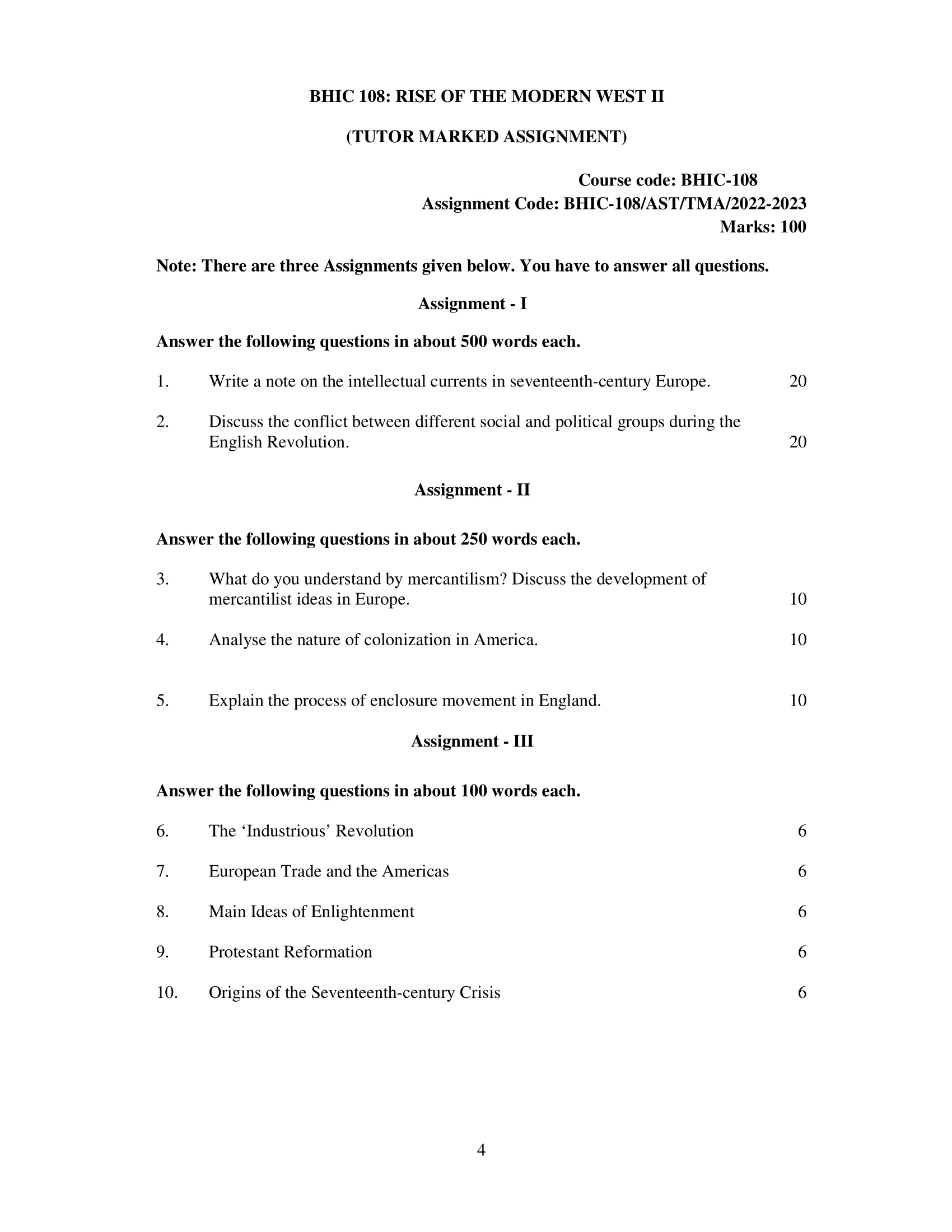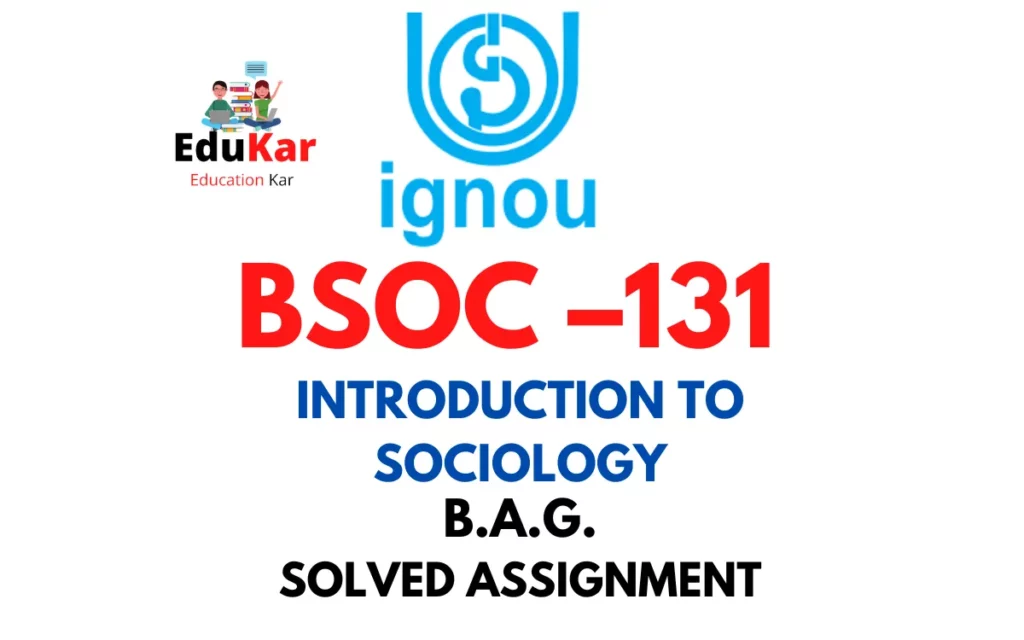Contents
- 1 Assignment – I
- 2 Answer the following questions in about 500 words each.
- 3 1. Write a note on the intellectual currents in seventeenth-century Europe.
- 4 2. Discuss the conflict between different social and political groups during the English Revolution.
- 5 Assignment – II
- 6 Answer the following questions in about 250 words each.
- 7 3. What do you understand by mercantilism? Discuss the development of mercantilist ideas in Europe.
- 8 4. Analyse the nature of colonization in America.
- 9 5. Explain the process of enclosure movement in England.
- 10 Assignment – III
- 11 Answer the following questions in about 100 words each.
- 12 6. The ‘Industrious’ Revolution.
- 13 7. European Trade and the Americas.
- 14 8. Main Ideas of Enlightenment.
- 15 9. Protestant Reformation.
- 16 10. Origins of the Seventeenth-century Crisis

| Title | BHIC-108: IGNOU BAG Solved Assignment 2022-2023 |
| University | IGNOU |
| Degree | Bachelor Degree Programme |
| Course Code | BHIC-108 |
| Course Name | RISE OF THE MODERN WEST-II |
| Programme Name | Bachelor of Arts (General) |
| Programme Code | BAG |
| Total Marks | 100 |
| Year | 2022-2023 |
| Language | English |
| Assignment Code | BHIC-108/AST/TMA/2022-2023 |
| Last Date for Submission of Assignment: | For June Examination: 31st April For December Examination: 30th September |

Assignment – I
Answer the following questions in about 500 words each.
1. Write a note on the intellectual currents in seventeenth-century Europe.
Ans: The seventeenth century was a period of great intellectual ferment in Europe, characterized by significant advances in science, philosophy, and religious thought. This was a time of significant cultural and intellectual changes, as the ideas and values of the Renaissance continued to evolve and new forms of thought emerged.
One of the most important intellectual currents of the seventeenth century was the Scientific Revolution. This was a time when major advancements were made in fields such as astronomy, physics, chemistry, and biology. Some of the most notable figures of the Scientific Revolution include Galileo Galilei, Johannes Kepler, and Sir Isaac Newton. Galileo made important discoveries about the laws of motion and astronomy, while Kepler developed the laws of planetary motion. Newton’s laws of motion and his theory of gravitation had a profound impact on our understanding of the natural world.
Another important intellectual current of the seventeenth century was the philosophical movement known as the Enlightenment. This movement was characterized by a focus on reason and empirical evidence, as well as a rejection of traditional authority and superstition. Some of the most important Enlightenment philosophers include John Locke, René Descartes, and Immanuel Kant. Locke’s ideas about the nature of knowledge and the role of the individual in society had a significant impact on the development of modern political theory. Descartes is famous for his statement “I think, therefore I am,” and his emphasis on the power of reason to determine truth. Kant is considered one of the greatest philosophers of the Enlightenment, and his ideas about the limits of human knowledge and the nature of reality had a profound impact on later philosophical movements.
Another significant intellectual current of the seventeenth century was the religious crisis that was taking place in Europe. This was a time of great upheaval in the Christian world, as the Protestant Reformation and the Catholic Counter-Reformation both gained momentum. The Protestant Reformation was a movement that challenged the authority of the Catholic Church and led to the creation of new Protestant denominations, such as the Lutherans, Calvinists, and Anglicans. The Catholic Counter-Reformation, on the other hand, was a movement aimed at re-asserting the authority of the Catholic Church and countering the spread of Protestantism. This period of religious crisis led to significant changes in the religious landscape of Europe, and also had a profound impact on intellectual and cultural life.
Ans: The English Revolution of the seventeenth century was a period of significant social, political, and religious upheaval in England. This revolution was characterized by conflict between various social and political groups, each with their own ideas about the direction in which the country should move. The conflict between these groups was rooted in deeply held differences over issues such as religion, the role of the monarchy, and the rights and privileges of different social classes.
One of the key conflicts during the English Revolution was between the Royalists, who supported the monarchy and the traditional social order, and the Parliamentarians, who advocated for greater political power for Parliament and greater freedom for individuals. The Royalists were primarily made up of the landed gentry, the Anglican Church, and the conservative elements of society. The Parliamentarians, on the other hand, included a broad cross-section of society, including merchants, artisans, and the rising middle class.
Another important conflict during the English Revolution was between the Anglicans and the Puritans. The Anglicans were the established Church of England, and they held a privileged position in society. The Puritans, on the other hand, were a group of Calvinist Protestants who sought to purify the Church of England of what they saw as remnants of the Catholic Church. The Puritans were a powerful force in England and played a significant role in the events of the English Revolution.
A third major conflict during the English Revolution was between the different social classes. The landed gentry, who were the wealthy landowners and aristocracy, held a privileged position in society and wielded significant political power. The middle class, however, was growing in size and wealth, and they sought to expand their political power and challenge the privileges of the landed gentry. The working class, meanwhile, was largely excluded from political power and sought to improve their economic and social conditions.
The conflict between these different social and political groups came to a head during the Civil War, which lasted from 1642 to 1651. The Royalists and the Parliamentarians fought a series of brutal wars, and the Parliamentarians emerged victorious. The monarchy was eventually abolished, and England became a republic under the leadership of Oliver Cromwell. The Puritans also gained significant influence during this time, and their ideas about religious and social reform had a profound impact on England.
Assignment – II
Answer the following questions in about 250 words each.
3. What do you understand by mercantilism? Discuss the development of mercantilist ideas in Europe.
Ans: Mercantilism is a economic theory and practice that was prevalent in Europe during the 16th to 18th centuries. It was based on the belief that wealth was a fixed amount and could only be acquired through trade, particularly through exports. Mercantilists believed that a country’s wealth and power could be measured by its supply of gold and silver and its holdings of territories and colonies.
The development of mercantilist ideas in Europe can be traced back to the late 16th and early 17th centuries, when Europe was in the midst of a commercial revolution. The growth of trade and commerce, as well as the discovery of new territories and resources, led to the emergence of powerful trading states like England, France, and the Netherlands. These states were in competition with each other for wealth and power, and they began to adopt policies aimed at increasing their exports and controlling their imports.
One of the key features of mercantilism was the use of government intervention in the economy to achieve these goals. Mercantilist governments imposed tariffs and restrictions on imports, while providing subsidies and incentives to their own industries to encourage exports. They also established monopolies and trade agreements with other countries to control access to markets and resources.
Mercantilist ideas were widely embraced by European rulers and governments, who saw them as a means of increasing their wealth and power. Some of the most famous mercantilist writers and theorists of the time include Thomas Mun, who wrote “England’s Treasure by Foreign Trade” in 1664, and Jean-Baptiste Colbert, who was the finance minister for Louis XIV of France.
Overall, mercantilism had a significant impact on the development of Europe, shaping its political and economic landscape and laying the foundation for the later development of classical economics and the Industrial Revolution. However, its limitations and flaws eventually led to its decline and the rise of new economic theories and practices in the late 18th and early 19th centuries.
4. Analyse the nature of colonization in America.
Ans: The colonization of America was a complex and multi-faceted process that had far-reaching impacts on the indigenous peoples and the lands they inhabited. The nature of colonization in America was shaped by a variety of factors, including economic, political, religious, and cultural motivations.
One of the main drivers of colonization was economic gain. European powers, such as Spain, France, and England, saw the New World as an opportunity to acquire wealth and resources, such as precious metals, agricultural products, and new markets for trade. In their quest for economic gain, colonizers established settlements and exploited the resources of the land, often with devastating consequences for the native populations.
Another major factor was politics. European powers used colonization as a means of expanding their territorial holdings and projecting their power on the global stage. This was often done through military force and the establishment of colonies with firm political control over the local populations.
Religion was also an important motivator for colonization, particularly for the Spanish, who sought to convert the native peoples to Catholicism. The French and English, on the other hand, saw their colonies as a means of spreading their particular brand of Protestantism.
Finally, cultural factors played a role in the nature of colonization in America. European colonizers brought with them their own cultural values and beliefs, which they often imposed on the native peoples. This resulted in the suppression of native cultures and the imposition of European norms and values on the colonies.
5. Explain the process of enclosure movement in England.
Ans: The enclosure movement was a significant transformation of the agricultural landscape in England that took place from the 16th to the 19th centuries. It was a process by which common land, which had previously been used by local communities for grazing, farming, and other purposes, was converted into private property and enclosed with fences or walls.
The enclosure movement had several causes, including the growth of population, the expansion of the market economy, and the desire of landlords and wealthy landowners to increase their profits. With the growth of population, the demand for food and other agricultural products increased, leading to higher prices for farm products. Landlords and wealthy landowners saw the opportunity to increase their profits by enclosing common land and converting it into private property.
The enclosure process involved a series of legal procedures, including the passage of parliamentary acts and the distribution of compensation to those who lost their rights to use the common land. The enclosure acts allowed landlords and wealthy landowners to expel small farmers and tenant farmers from the land, and to consolidate their holdings into larger, more efficient farms.
The enclosure movement had a profound impact on the rural landscape and the lives of the people who lived and worked in the countryside. For many small farmers and tenant farmers, the loss of access to common land meant a loss of livelihood and a decline in their standard of living. For the wealthy landowners and landlords, however, enclosure was a means of increasing their profits and consolidating their power.
Assignment – III
Answer the following questions in about 100 words each.
6. The ‘Industrious’ Revolution.
Ans: The “Industrious Revolution” refers to a historical period in which people shifted from subsistence agriculture and handicrafts to wage-based labor and the production of goods on a larger scale. This transformation was characterized by increased efficiency, productivity, and specialization in the workplace, and it had a profound impact on the economic and social structures of the societies in which it occurred. The Industrious Revolution was a key factor in the growth of the modern market economy, as well as the development of modern forms of work and leisure. It also contributed to the rise of new classes of entrepreneurs and workers, and had a lasting impact on the distribution of wealth and power in society.
7. European Trade and the Americas.
Ans: European trade with the Americas was a key factor in the colonization and development of the New World. The desire for new trade routes and access to precious metals, agricultural products, and new markets was a major driver of European expansion into the Americas. The arrival of European colonizers in the Americas had a profound impact on the indigenous peoples and the lands they inhabited, as the Europeans established settlements, exploited resources, and imposed their own cultural and economic systems. The trade between Europe and the Americas was also a key factor in the growth of the Atlantic economy, which linked the economies of Europe, Africa, and the Americas. This trade network was driven by the demand for goods such as sugar, tobacco, and slaves, and it helped to shape the global economy in the centuries that followed. The legacy of European trade with the Americas continues to be felt today, as the region remains an important center of trade and economic activity.
8. Main Ideas of Enlightenment.
Ans: The Enlightenment was an intellectual and cultural movement that emerged in Europe in the late 17th and 18th centuries. It was characterized by a focus on reason, science, and individualism, and a rejection of traditional ideas and institutions. The following are some of the main ideas of the Enlightenment:
- Reason: Enlightenment thinkers believed that reason was the key to understanding the world and improving human society. They saw reason as a means of overcoming superstition, ignorance, and prejudice.
- Science: Enlightenment thinkers were committed to scientific inquiry and the pursuit of knowledge. They believed that scientific discovery was essential for progress and that science had the power to transform human society.
- Individualism: Enlightenment thinkers believed in the importance of individual rights and freedoms, including freedom of speech, religion, and the press. They saw individuals as rational and capable of making their own decisions and shaping their own lives.
- Democracy: Enlightenment thinkers believed in the importance of democratic governance, and they saw the individual as the foundation of political authority. They believed that governments should be based on the consent of the governed and that citizens should have a voice in the political process.
- Progress: Enlightenment thinkers were optimistic about the potential for progress and improvement in human society. They believed that the application of reason and science would lead to the creation of a better world for all people.
These ideas had a profound impact on the development of Western thought and culture, and they continue to shape our understanding of the world and our place in it. The Enlightenment is considered one of the key turning points in Western history, as it helped to lay the foundations for the modern world and many of the social, political, and cultural institutions that we take for granted today.
9. Protestant Reformation.
Ans: The Protestant Reformation was a major religious and cultural movement that took place in Europe in the 16th century. It was a response to what many saw as the corruption and abuses within the Catholic Church and aimed to reform the Church from within. However, when the Church resisted these reforms, many people turned to the creation of new Protestant denominations. The following are some of the key ideas of the Protestant Reformation:
- Sola Scriptura: The idea that the Bible is the only source of religious authority, and that the Church’s teachings and practices should be based on the Bible alone.
- Justification by faith: The idea that people can be saved through faith in Jesus Christ alone, rather than through good works or the sacraments of the Church.
- Priesthood of all believers: The idea that all believers have direct access to God and don’t need to go through intermediaries such as priests or bishops.
- The rejection of religious images: The idea that religious images and artwork should be removed from churches and religious spaces, as they were seen as distracting from the message of the gospel.
These ideas had a profound impact on European society, as they challenged the authority of the Catholic Church and created new forms of religious expression and practice. The Protestant Reformation also had a lasting impact on politics, as it contributed to the growth of secularism and the decline of religious authority in many parts of Europe. The Protestant Reformation remains one of the key turning points in Western history and its ideas and legacy continue to shape the world today.
10. Origins of the Seventeenth-century Crisis
Ans: The seventeenth-century crisis was a period of great upheaval and change in Europe, characterized by political, religious, and economic turmoil. The origins of this crisis can be traced to several key factors, including:
- Political instability: The seventeenth century was marked by frequent wars and conflicts between European states, as well as by internal political upheavals, such as the English Civil War and the Fronde in France.
- Economic difficulties: The seventeenth century was a time of economic hardship, as the population of Europe was growing faster than its economy. This led to rising food prices, unemployment, and social unrest.
- Religious conflict: The Protestant Reformation and the subsequent split of the Western Church created religious tensions and conflict that were often exacerbated by political interests.
- Scientific and intellectual developments: The seventeenth century saw a number of major scientific and intellectual developments, such as the scientific revolution and the Enlightenment, that challenged traditional ways of thinking and threatened established institutions.
- Climate change: The seventeenth century was also a time of significant climate change, with several severe cold spells that disrupted agriculture and contributed to economic difficulties.
These factors combined to create a complex and volatile situation in Europe, with far-reaching political, economic, and cultural consequences. The seventeenth-century crisis was a turning point in European history, as it helped to lay the foundations for the modern world and many of the social, political, and cultural institutions that we take for granted today.
How to Download BHIC-108 Solved Assignment?
You can download it from the www.edukar.in, they have a big database for all the IGNOU solved assignments.
Is the BHIC-108 Solved Assignment Free?
Yes this is absolutely free to download the solved assignment from www.edukar.in
What is the last submission date for BHIC-108 Solved Assignment?
For June Examination: 31st April, For December Examination: 30th October
















